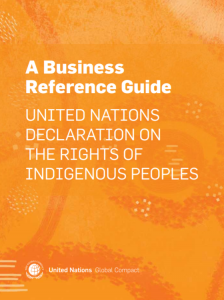From the Guide:
The objective of this guide (the “Guide”) is to help business understand, respect, and support the rights of indigenous peoples by illustrating how these rights are relevant to business activities.
The advice offered in this Guide is not prescriptive and a “one-size-fits-all” approach is impracticable. The diversity of issues and contexts, as well as a business’ size, sector, ownership and structure, means that the scale and complexity of the measures necessary to ensure respect for indigenous peoples’ rights and opportunities to support such rights will vary depending on a number of factors. These factors are likely to include the following: the particular indigenous peoples and their cultures, histories and preferences regarding development; the business and its objectives; the proposed activities and the regulatory environment; and the severity of the business’ potential adverse impact, if any.
This Guide encourages business to engage in meaningful consultation and partnership with indigenous peoples on a local level and to adapt the principles discussed and practices suggested here to their distinct situations and contexts.
A Practical Supplement to this Guide, which includes actual case studies of business taking action to respect and support the rights of indigenous peoples, along with a compilation of additional resources, can be found on the UN Global Compact’s website at http://unglobalcompact.org/Issues/human_rights/indigenous_peoples_rights.html. Businesses, indigenous peoples and others can also participate in an online forum here: http://human-rights.unglobalcompact.org/ dilemmas/indigenous-peoples/.

